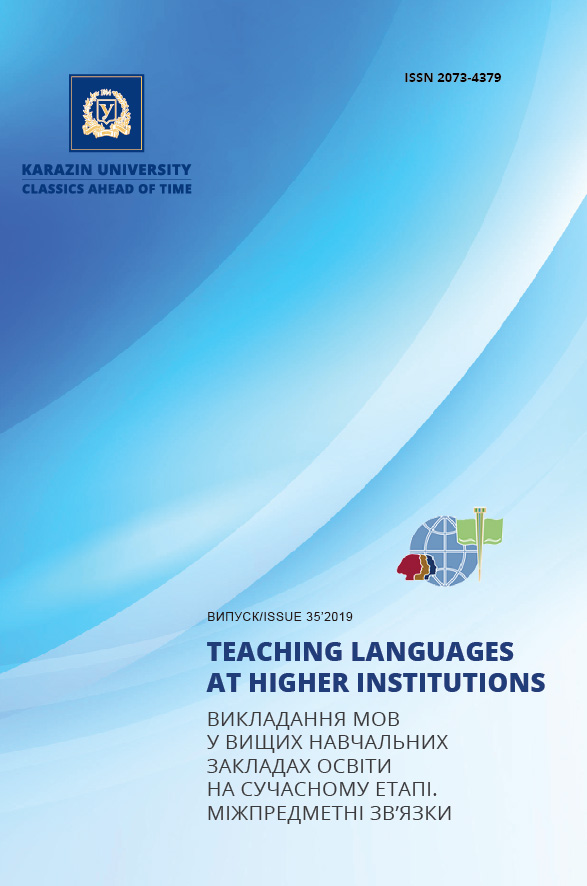The formation of speech competence in medical students in classes of “The Ukrainian Language (for Specific Purposes)”
Abstract
In the article, we investigate the formation of speech competence in medical students in classes of the Ukrainian Language for Specific Purposes. We have substantiated the appropriateness of complex formation of linguistic and speech competence in the students of medical educational institutions. We have emphasized that the professional communication of future medical workers should be formed as a result of thorough training aimed at professional expertise. The professional activity can be exercised only by persons with a high professional level of culture, intercultural communication and ability to improve professionally. In the article, we have stressed the importance of formation of the professional communicative competence in future workers of the health industry. There have been defined the characteristic features of the communicative culture of the medical employee. We have elaborated on the methodology of the formation of communicative competence in future medical workers. We have proved that successful formation of professional communication skills in medical students depends on active enrichment of their vocabulary with terminology based on profession-oriented texts and dictionaries, work on stable skills of communicative self-control and self-analysis, the formation of critical thinking, desire to work independently, compliance with the rules of linguistic courtesy. Communicative competence of students is effectively formed with the aid of the technology of critical thinking development as it gives a possibility to create ambiguous situations and consider one problem from the different viewpoints. We propose to use debates in class as a form of communicative strategy that facilitates the process of new topics acquisition, induces the students to search for new information and extends their knowledge, develops not only communicative, but also intellectual capacities of medical students, and educates morally conscientious professionals.
Downloads
References
Bilous, N. (2014). Formuvannya movlennyevoyi kompetenciyi v studentiv filologiv u procesi vyvchennya metodyky vykladannya ukrayinskoyi literatury [Formation of speech competence in students of philology in the process of studying the methodology of teaching Ukrainian literature]. Metodychnyj poshuk: Vykladaczko-studentski naukovi roboty z pytan metodyky vykladannya movy i literatury [Methodological search: Teacher-student scientific works on the methods of teaching language and literature]. Zhytomyr: ZhDU im. I. Franka, 12, p. I, pp. 45–51 [in Ukrainian].
Busel, V. (2001). Velykyj tlumachnyj slovnyk suchasnoyi ukrayinskoyi movy [A great explanatory dictionary of modern Ukrainian]. Kyiv; Irpin: VGF: “Perun” [in Ukrainian].
Freeley, A. and Steinberg, D. (2009). Argumentation and Debate: Critical Thinking for Reasoned Decision Making. Belmont, CA: Wadsworth [in English].
Karpenko, L. (2006). Kategorialnyj analiz ponyatij obshhenie i kommunikaciya [Categorical analysis of the concepts of communication and interction]. Mir psihologii [The world of psychology]. 4, pp. 77–85 [in Russian].
Kharkivska, A. (2012). Suchasni vymogy do pedagoga [Modern requirements for the teacher]. Materyaly Mezhdunarodnoj nauchno-praktycheskoj konferencyy “Prepodavatel kak subekt y obekt obrazovatelnogo processa. Vek XXI” [Materials of the International scientific-practical conference “Teacher as a subject and object of the educational process. Century XXI” (February 1, 2012)]. Kharkiv: NUA, Раrt II, pp. 180–189 [in Ukrainian].
Kyyanko-Romanyuk, L. (2004). Zarubizhna i nacionalna praktyka rozvytku krytychnogo myslennya v uchniv i studentiv [Foreign and national practice of developing critical thinking in school pupils and students]. Vyshha osvita Ukrayiny [Higher education in Ukraine]. 4, рр. 109–113 [in Ukrainian].
Luczak, S., Lytvynenko, N., Turgan, O. et al. (2017). Ukrayinska mova za profesijnym spryamuvannyam [Ukrainian language for professional purposes]. Luczak, S. (Ed.). Kyiv: Znannya [in Ukrainian].
Nikolayeva, S. (2003). Zagalnoyevropejski rekomendaciyi z movnoyi osvity: vyvchennya, vykladannya, ocinyuvannya [Pan-European recommendations for language education: studying, teaching, assessment]. Kyiv: Lenvit [in Ukrainian].
Ovcharuk, O. (2003). Kompetentnosti yak klyuch do onovlennya zmistu osvity [Competence as the key to updating the content of education ]. Strategiya reformuvannya osvity v Ukrayini [Education Reform Strategy in Ukraine]. Kyyiv: “K.I.S.”, рр. 13–39 [in Ukrainian].
Skybun, N. (2015). Profesijna movlennyeva kompetentnist yak naukove ponyattya [Professional Speech Competence as Scientific Notion]. Science and Education a New Dimension. Pedagogy and Psychology. Budapest. Part III (37), Issue 75, pp. 76–79 [in Ukrainian].
Sukhareva, T. (2002). Formirovanie kommunikativnyh strategij slovoupotreblenija u studentov nejazykovyh vuzov [Formation of communicative strategies for the use of students of non-linguistic universities]. Extended abstract of candidate’s thesis. Tambov: TGU im. G. Derzhavina [in Russian].
Vykhovanecz, I. (1990). Tayina slova [The secret of the word]. Kyiv: Kultura [in Ukrainian].
Zakon Ukrayiny “Pro osvitu”: chynne zakonodavstvo stanom na 22 lyutogo 2019 roku: oficijnyj tekst [The Law of Ukraine “On Education” as of February 22, 2019: official text].(2019). Kyiv: Alerta [in Ukrainian].
Zakon Ukrayiny “Pro zabezpechennya funkcionuvannya ukrayinskoyi movy yak derzhavnoyi”from 25.04.2019, no 2704-VIII [The Law of Ukraine “On Ensuring the Functioning of the Ukrainian Language as the State Language” by order № 2704-VIII dated April 25, 2019]. Available at: https://zakon.rada.gov.ua/laws/show/2704-19 [Accessed 31 August 2019] [in Ukrainian].
Zolotukhin, G., Lytvynenko, N. and Misnyk, N. (2001). Fakhova mova medyka [Specialist medical language]. Kyiv: Zdorovya [in Ukrainian].

